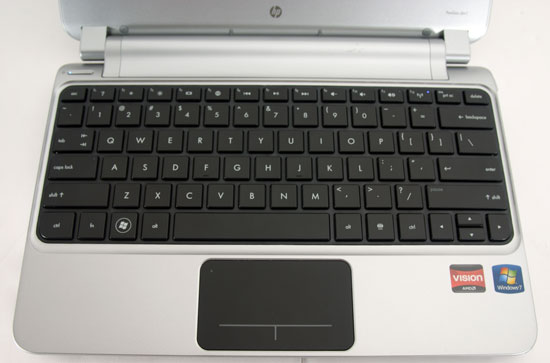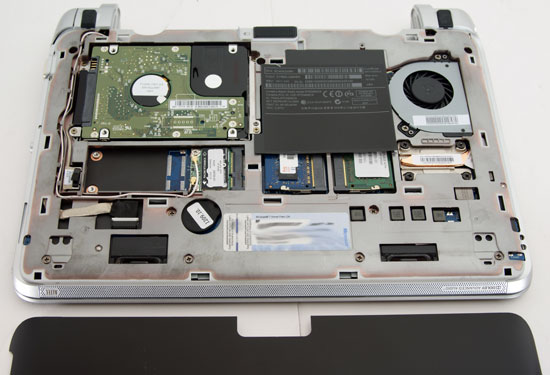HP dm1z: Taking Fusion on the Road
by Dustin Sklavos on February 21, 2011 7:00 PM ESTThe Swankiest Netbook You Ever Did See
First we should make one thing clear: the HP dm1z is basically small enough and slow enough to be considered a netbook, with most of the good and bad connotations that term brings with it. With that in mind, the dm1z is a remarkably attractive piece of kit and as you'll see, in many ways it feels like the netbook finally arriving at about the form factor and performance level it always needed to be at.
The lid of the dm1z is a textured black plastic that is a healthy stride away from the glossy plastic hell that used to plague HP's older models; it's attractive and doesn't easily pick up fingerprints and smudges, and the HP logo is nice and subdued in the lower corner. There's a silver trim that extends around the lid and into the body.
When you pop open the dm1z, you'll see that trim matched with silver matte plastics on the screen bezel and tastefully framing the keyboard and touchpad. HP has made some really great strides as of late in improving the looks of their notebooks, and the dm1z continues that trend. The silver plastic is used for the interior surface along with the battery and rim of the system and is complemented by sparse usage of white LED indicator lights.

HP has been pushing a standardized chiclet-style keyboard across all of their lines at this point, and it suits the dm1z. The 11.6" form factor allows HP to squeeze a comfortable full-sized keyboard into the unit, too, with the document navigation keys helpfully and logically mapped to Fn+arrow key combinations. The keys aren't marked that way, but it's easy enough to figure out. There's no number lock either, but I've never found the 10-key wrangled onto the main keyboard to be particularly useful. The only complaints about the keyboard are minor ones: HP, like Dell, opts to default the function keys to controls and shortcuts (though this can be toggled in the UEFI), and the left and right arrow keys are basically double-sized compared to the up and down arrows. On the whole, though, this is a solid netbook keyboard that most people should be very comfortable with.
The touchpad is more of a mixed bag, but kudos to HP for actually using a separate piece of plastic for it instead of just building the sensor into the inside panel. Of course, there's a reason for that: HP is using the same clickpad that's dogged their mainstream notebooks over the past year. To be fair the HP implementation is among the better ones used for Windows-based systems, it's multitouch capable, and the tracking surface is comfortable, but we would still rather see dedicated buttons on future refreshes. If you're using an external mouse or keep brushing the touchpad (not a problem I had in testing it), you can actually double-tap the top left corner of the touchpad with your finger to disable it; a pinpoint orange LED will glow when the touchpad is disabled.

One of my favorite features of the dm1z is actually on the bottom. HP has gone a long way towards simplifying user upgrades by simply putting one large, screwless panel on the bottom of the unit. The panel simply snaps on and off and feels both sturdy and user-friendly while also making the dm1z as a whole more attractive by hiding serial numbers and the Windows key. As you can see, everything you'd want to upgrade is easily accessible.
Taken as a whole I'll admit to being fairly smitten by the dm1z's design. It's remarkably well streamlined and clearly designed to improve the user experience while avoiding looking too chintzy or cheap. This is definitely one of the best-looking netbooks I've ever seen and it feels very solid.
















108 Comments
View All Comments
Dex1701 - Tuesday, February 22, 2011 - link
So...typing reports is the only advantage a netbook has over current-generation tablets? I can't see how someone could think that's true unless the only thing they use a computing device for outside of work is basic web browsing or MP3 listening.ganeshts - Monday, February 21, 2011 - link
What about those tablet-laptop hybrids? For on-the-go computing, I still would like something more powerful than Atom level performance.From looking at 2 generations of Atom, I think the problem with x86 is that whenever the architects target low power, they reduce the performance so much that is is no longer a good experience with Windows.
The reason I am 'hyping' up tablets is that it gets rid of the Windows OS altogether. (Another reason why I think Windows 7 slates and tablets are going to be DoA). The moment consumers see Windows, they expect a minimum level of performance which is sorely lacking in the Atom class CPUs.
Btw, I would like to get an idea of how much the nettop / netbook market has gone down since the hyped up 2008 days... I don't even see Intel's CedarView getting much coverage now.. It is probably going to be restricted to embedded SKUs.
JarredWalton - Monday, February 21, 2011 - link
Don't forget that a big problem with Atom netbooks is that the inexpensive models most people purchased only had 1GB RAM, which is simply not enough for Windows 7 (or Vista) -- though it was "okay" in XP netbooks. The HD 6310 is about 10X (20X even) better than the GMA 950/3150 in Atom, and the E-350 is more than twice the speed of single-core Atom (and still 50% faster than dual-core Atom in most cases). Heck, Vivek even has a C-50 model in hand and I played with it briefly yesterday. It certainly felt faster than netbook Atom, even at 1.0GHz (but I'm not sure if it has 1GB or 2GB).The problem is, in ditching the Windows OS you also ditch all of the applications made for Windows. If you're on a smartphone or tablet, I can understand that. Move to a full laptop, though, and even if netbooks are slow I'd still rather have my standard applications and not dumbed-down (or non-existent) versions. Brazos is really what the second generation of netbooks (after the first Eee PC with the old 600MHz underclocked Celerons) should have been. Atom was a bad design (because of the crippled IGP) from the start, and all it really succeeded in doing is giving a lot of people a really poor impression of netbooks.
Visual - Tuesday, February 22, 2011 - link
"Windows 7 slates and tablets are going to be DoA"No they won't. Or rather, weren't. Because they've been out and about for years now, and though not a huge success, they aren't dead either. They've been a niche product because the performance just wasn't there before, and the price was high, but time improves both of those aspects.
Today, finally, a tablet convertible, or maybe even better a pure slate combined with a wireless keyboard with a touchpad can have a great performance and run Windows and all the apps and games for it quite well, at an affordable price. Once such a device is released, it will spell the end of all non-windows "tablets" that can only run cell-phone applets.
Take as an example the HP tm2. Performance wise, it was great for its time: a decent CULV CPU way above anything Atom; a great dedicated graphic card on which I've played WoW and EVE Online and Civ V and whatnot; switchable with the integrated intel crap for great whole-day battery life; both finger and pen-enabled touchscreen by Wacom. It wasn't without disadvantages of course, mainly the terrible screen viewing angles, touchpad buttons and a weight a bit on the high side, at least for holding in one hand in tablet mode. But these could be easily overcome now, all while also improving on the good sides that it had. I can't wait for it's update, it will be a great hit.
I feel windows tablets and slates are up for a good increase in popularity in the next couple years.
You're right for one thing though, I don't mean devices that are using Atom. Not when low-voltage variants of real CPUs are so much better.
Conficio - Tuesday, February 22, 2011 - link
I own a Windows convertable laptop and I tried to use the tablet portion about for two weeks. The most annoying thing? Each orientation change needed to recalibrate the stylus, so switching between laptop mode and tables was a 1 min exercise. Teh second annoyance. The character by character hand writing recognition, did three characters correctly just to fould the eintire word after the forth. And character correction is a pain.And I also realized that you can't just translate the Winodw smoue oriented UI memes into good tablet UI gestures.
So yes it was dead and I have not heard of any revival of Windows tablet capability.
Dribble - Tuesday, February 22, 2011 - link
Have you actually tried to use windows 7 touch interface? Basically you have to use a pen - it's pretty well unusable with fingers. Even then windows is really designed for mouse+keyboard - anything less and it gets hard to use.Given a slick designed-from-the-ground-up to support tablets OS/UI that will be these new android/mac tablets there's no comparison. They will both be very easy to use, feel fast and be dead quiet.
The windows ones will feel slow (despite having much more processing power), be much harder to use, and be noisy (tablets with no spinning HD and no fans are just so nice in comparison to even a *quiet* windows box).
jabber - Tuesday, February 22, 2011 - link
So you want a tablet rather than a netbook but you also want something more powerful than Atom?Think you need to sit down and think through just what it is you do want.
Visual - Tuesday, February 22, 2011 - link
You need to stand up and get acquainted with reality. As I posted just above you, a 12" tablet with something more powerful than Atom and even a dedicated graphic card already exists. Meet the year old HP tm2.nitrousoxide - Monday, February 21, 2011 - link
Try get a tablet below USD 500 that can play 1080p video, do word editing, play modern 3D PC games at medium or low settings(but way better than those on an iPad) before saying that netbook is out of the game.pja - Monday, February 21, 2011 - link
"With the tablet craze about to take off following the year of the iPad, I am not even sure people want to throw away their money on anything so anaemic and running Windows..."Well I for one considered an iPad and perhaps a wait for an Android alternative but when the rational side of my brain took over I found that I could not justify the cost (AUD1,000 + for the 64 Gb iPad with no phone in Australia). Instead I got myself a Toshiba NB550D which is similar to the HP above (Brazos C-50 rather than E-350 and smaller screen but bigger than an iPad).
The Toshiba is half the price, has a similar form factor (when folded), uses the same operating system as my desktop PC _AND_ runs all the same applications as my desktop so the new machine learning curve is NIL!
I'm more than happy with my Windows 7 based anaemic netbook! At least its not just a toy or fashion accessory, it can actually do real work while I'm on the road.
Regards,
Peter